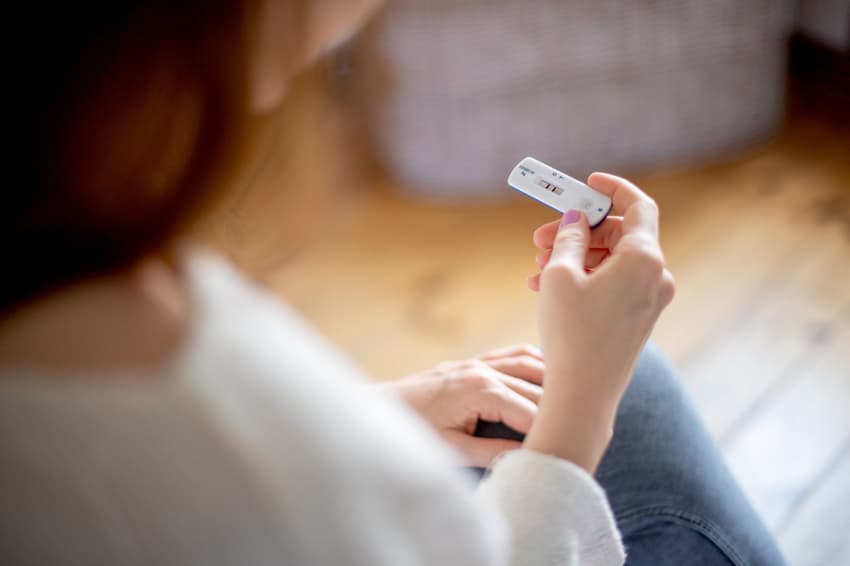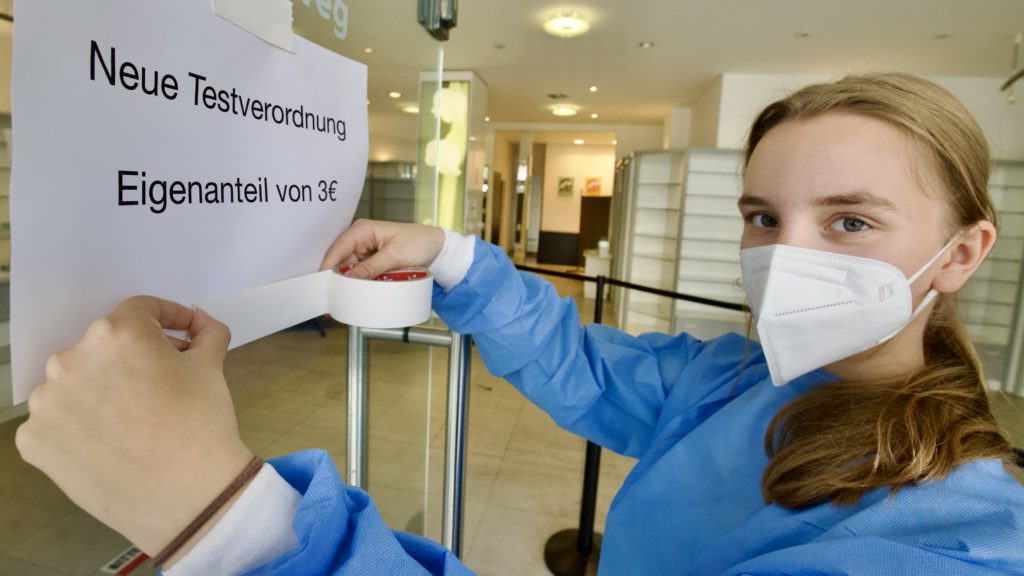What should I do if I get Covid in Germany?

The rules around Covid infections in Germany have changed a lot over the last year, and many people are wondering what they should do if they catch Covid now. We've put together a guide to the latest rules.
Can I get a free Covid "Bürgertest" if I have symptoms?
There are strict and limited categories for who is exempt from paying for an official antigen test (a so-called Bürgertest) in Germany now, and having symptoms is not one of them.
Those who can get an antigen test for free include children under the age of five, people who can't be vaccinated for medical reasons, pregnant women in their first trimester, as well as visitors and workers at various healthcare facilities. All of these exemptions require some sort of proof.
You can, however, get a free test if you can prove that a member of your household has Covid. For this, you would need proof of a positive test and proof of a matching residential address.
You can also get a free test to end your mandatory isolation. For this, you also need proof of having had a Covid infection.
READ ALSO: Colds and flu: What to do and say if you get sick in Germany
The federal Health Ministry’s website advises symptomatic patients to stay at home and call their doctor to find out what they should do next. If your doctor decides that you need a test, the cost of testing carried out by them will be paid for by your health insurer.
Can I get a Covid test for €3 if I have symptoms?
Having symptoms alone isn't enough to qualify for a €3 test.
For this, you will need to have a red warning on the Corona warning app, proof that you intend to go to an indoor event on the day of testing, or proof that you will have contact with someone with a high risk of contracting a severe case of Covid-19 (someone over 60 years of age, people with disabilities, people with pre-existing conditions) on the day of the test.

A test centre worker sticks a sign on a glass wall saying that Coronatests cost 3 euros. Photo: picture alliance/dpa | Andreas Dunker
If you don't qualify for either a free or €3 test, you will have to pay whatever your local test centre is charging. You can also test yourself at home using an antigen self-test.
If you have Covid symptoms, you can also contact your doctor who may arrange for you to do a PCR test (or advise another test).
Do I have to do a PCR test?
No. Previously, people who tested positive for Covid were obliged to do a PCR test, but this is no longer a requirement.
READ ALSO: EXPLAINED: Where Covid infections are rising rapidly in Germany
If you want to get a PCR test, however, you'll need proof of a positive Covid antigen test to get one for free. A spokesperson for the Federal Ministry for Health told The Local that a positive self-test is enough to entitle you to a free PCR test - but not an official antigen test (a so-called Bürgertest).
Unlike earlier in the year, a red warning on the Corona warn app won't suffice for a free PCR test.
I’ve tested positive for Covid – what now?
If you’ve tested positive for Covid with an antigen or PCR test, you have to isolate for at least five days. This rule applies even if you’re fully vaccinated and don’t have any symptoms.

A woman sits on her bed during isolation after a positive Covid test. Photo: picture alliance/dpa | Sebastian Gollnow
The general rule across German states is that you have to isolate for 10 days, but you can end this if you've been symptom-free for 48 hours and have a negative test from day five. Some states allow people to end the quarantine from the fifth day onwards if they no longer have symptoms. Check your local authority for the rules around this in your area.
During home isolation, you're not allowed to have visits from anyone from another household.
Do I need to tell someone that I have Covid?
Unlike earlier in the year, you are no longer obliged to tell your local health authority that you have Covid.
How can I get a sick note?
In Germany, you need to provide your employer with a sick note (eine Arbeitsunfähigkeitsbescheinigung) after three consecutive days of illness.
READ ALSO: EXPLAINED: The new rules around getting a sick note over the phone in Germany
If you have Covid, you'll be able to get this over the phone from your doctor until at least November 30th, 2022.
What do I do once the five days are up?
If the test is negative on day five, you can end your isolation. If not, you have to keep self-isolating until you get a negative test result.
Workers in healthcare, elderly care and nursing facilities, outpatient care services, and institutions for integration assistance, must be symptom-free for at least 48 hours and have a negative antigen or PCR test taken no earlier than day five following the first positive test to return to work.
How can I get a proof of recovery certificate?
If you need an official certificate to prove that you have recovered from a Covid infection, you must have a PCR test. The certificate will be valid 28 days following the PCR test result. Antigen testing is not sufficient for getting a proof of recovery certificate.
Comments
See Also
Can I get a free Covid "Bürgertest" if I have symptoms?
There are strict and limited categories for who is exempt from paying for an official antigen test (a so-called Bürgertest) in Germany now, and having symptoms is not one of them.
Those who can get an antigen test for free include children under the age of five, people who can't be vaccinated for medical reasons, pregnant women in their first trimester, as well as visitors and workers at various healthcare facilities. All of these exemptions require some sort of proof.
You can, however, get a free test if you can prove that a member of your household has Covid. For this, you would need proof of a positive test and proof of a matching residential address.
You can also get a free test to end your mandatory isolation. For this, you also need proof of having had a Covid infection.
READ ALSO: Colds and flu: What to do and say if you get sick in Germany
The federal Health Ministry’s website advises symptomatic patients to stay at home and call their doctor to find out what they should do next. If your doctor decides that you need a test, the cost of testing carried out by them will be paid for by your health insurer.
Can I get a Covid test for €3 if I have symptoms?
Having symptoms alone isn't enough to qualify for a €3 test.
For this, you will need to have a red warning on the Corona warning app, proof that you intend to go to an indoor event on the day of testing, or proof that you will have contact with someone with a high risk of contracting a severe case of Covid-19 (someone over 60 years of age, people with disabilities, people with pre-existing conditions) on the day of the test.

If you don't qualify for either a free or €3 test, you will have to pay whatever your local test centre is charging. You can also test yourself at home using an antigen self-test.
If you have Covid symptoms, you can also contact your doctor who may arrange for you to do a PCR test (or advise another test).
Do I have to do a PCR test?
No. Previously, people who tested positive for Covid were obliged to do a PCR test, but this is no longer a requirement.
READ ALSO: EXPLAINED: Where Covid infections are rising rapidly in Germany
If you want to get a PCR test, however, you'll need proof of a positive Covid antigen test to get one for free. A spokesperson for the Federal Ministry for Health told The Local that a positive self-test is enough to entitle you to a free PCR test - but not an official antigen test (a so-called Bürgertest).
Unlike earlier in the year, a red warning on the Corona warn app won't suffice for a free PCR test.
I’ve tested positive for Covid – what now?
If you’ve tested positive for Covid with an antigen or PCR test, you have to isolate for at least five days. This rule applies even if you’re fully vaccinated and don’t have any symptoms.

The general rule across German states is that you have to isolate for 10 days, but you can end this if you've been symptom-free for 48 hours and have a negative test from day five. Some states allow people to end the quarantine from the fifth day onwards if they no longer have symptoms. Check your local authority for the rules around this in your area.
During home isolation, you're not allowed to have visits from anyone from another household.
Do I need to tell someone that I have Covid?
Unlike earlier in the year, you are no longer obliged to tell your local health authority that you have Covid.
How can I get a sick note?
In Germany, you need to provide your employer with a sick note (eine Arbeitsunfähigkeitsbescheinigung) after three consecutive days of illness.
READ ALSO: EXPLAINED: The new rules around getting a sick note over the phone in Germany
If you have Covid, you'll be able to get this over the phone from your doctor until at least November 30th, 2022.
What do I do once the five days are up?
If the test is negative on day five, you can end your isolation. If not, you have to keep self-isolating until you get a negative test result.
Workers in healthcare, elderly care and nursing facilities, outpatient care services, and institutions for integration assistance, must be symptom-free for at least 48 hours and have a negative antigen or PCR test taken no earlier than day five following the first positive test to return to work.
How can I get a proof of recovery certificate?
If you need an official certificate to prove that you have recovered from a Covid infection, you must have a PCR test. The certificate will be valid 28 days following the PCR test result. Antigen testing is not sufficient for getting a proof of recovery certificate.
Join the conversation in our comments section below. Share your own views and experience and if you have a question or suggestion for our journalists then email us at [email protected].
Please keep comments civil, constructive and on topic – and make sure to read our terms of use before getting involved.
Please log in here to leave a comment.